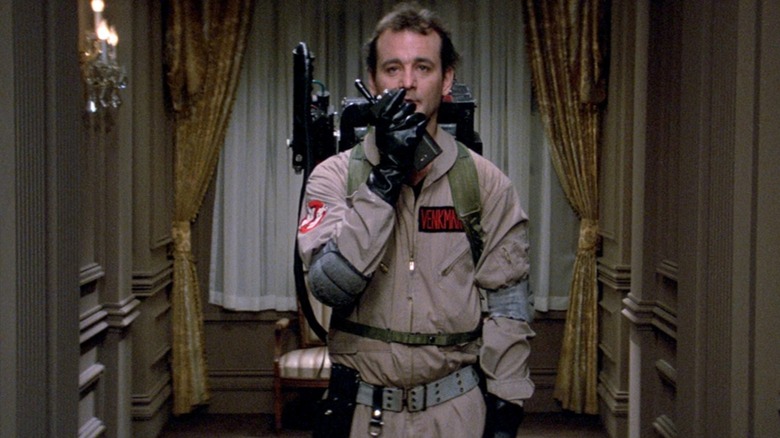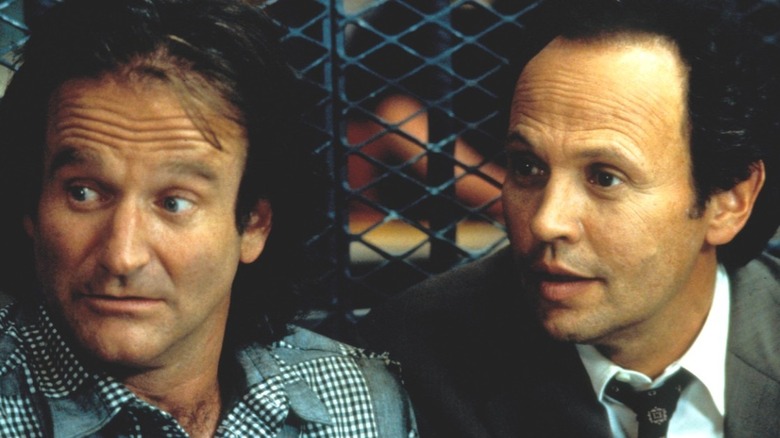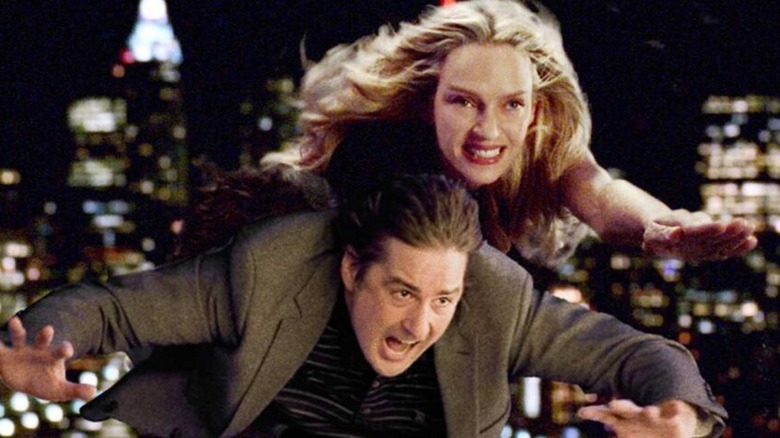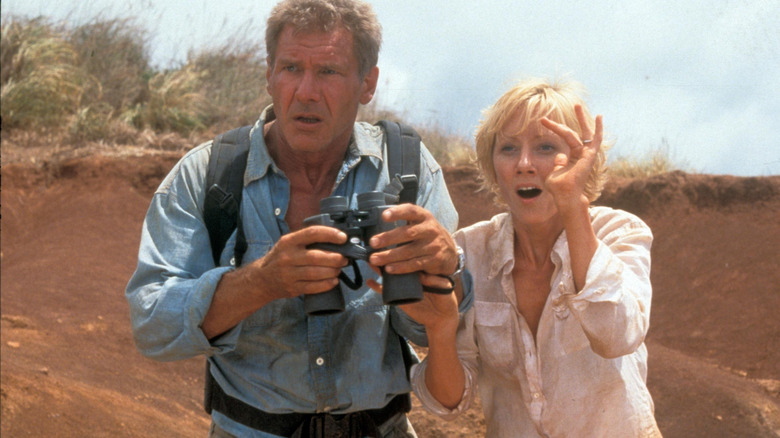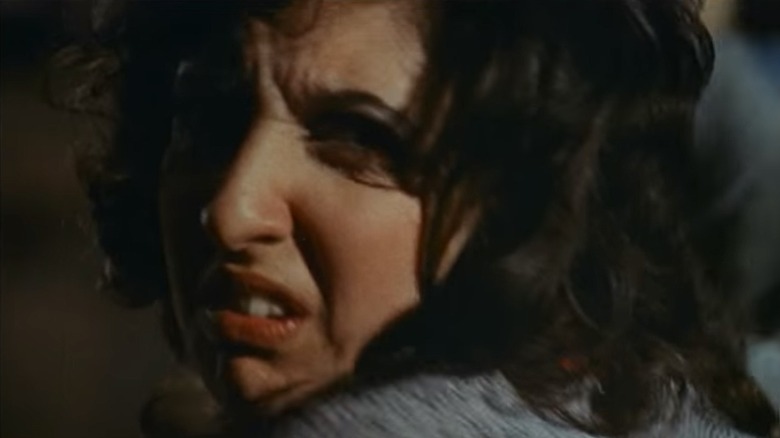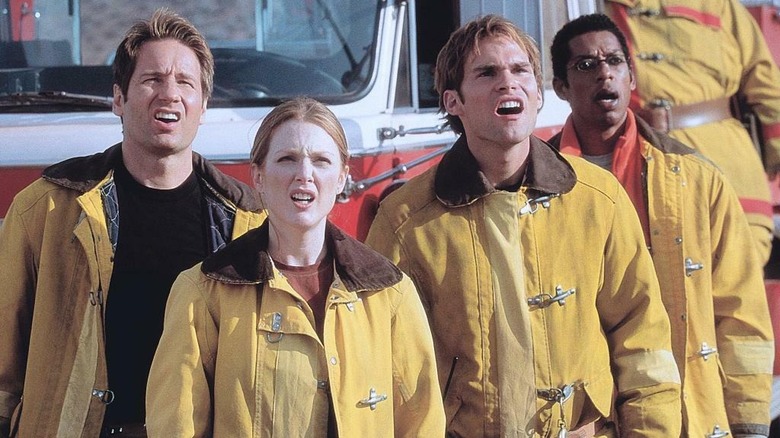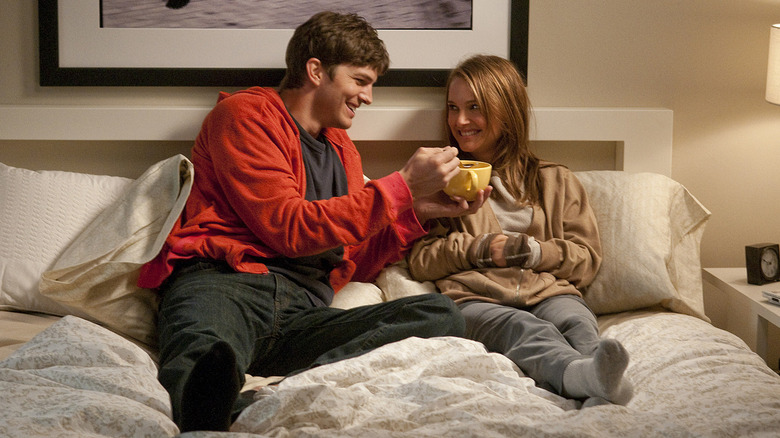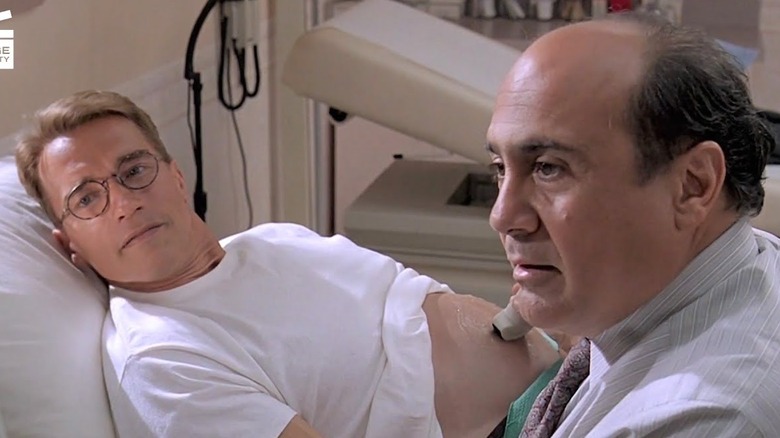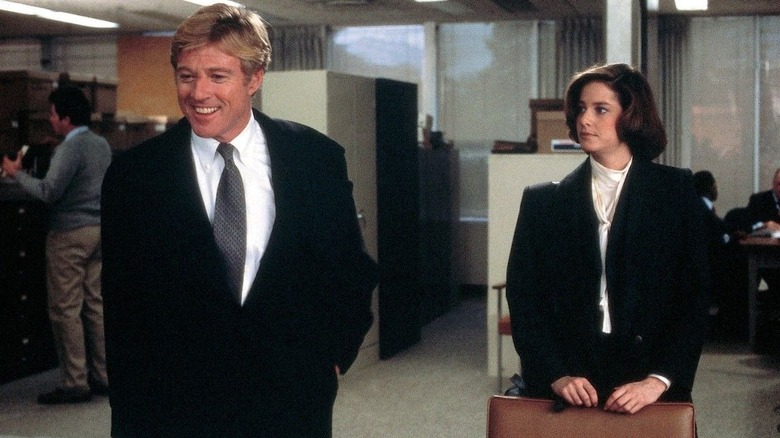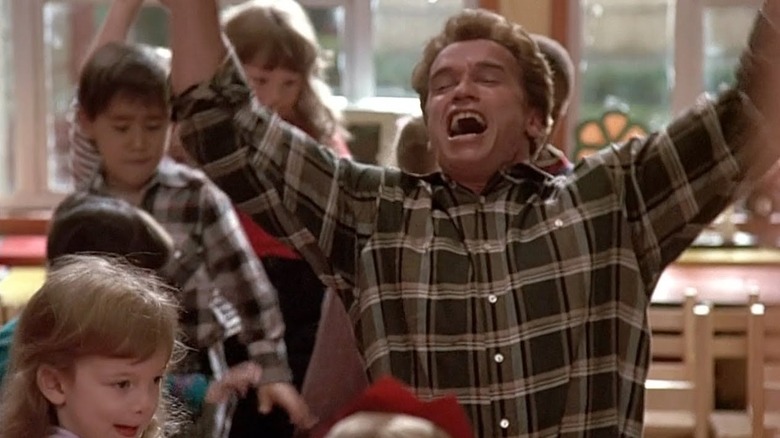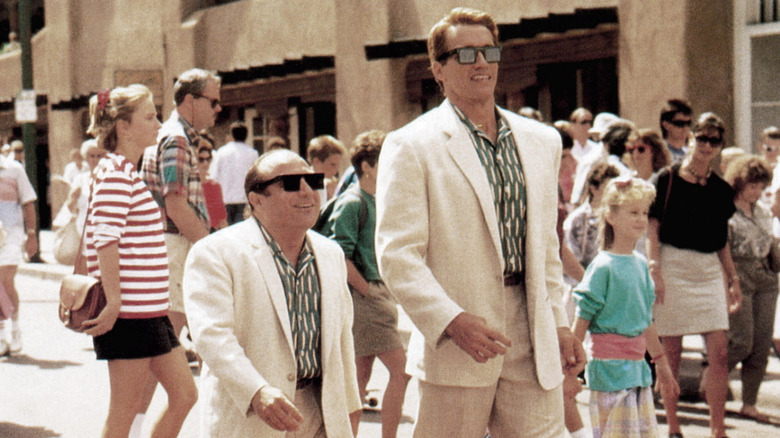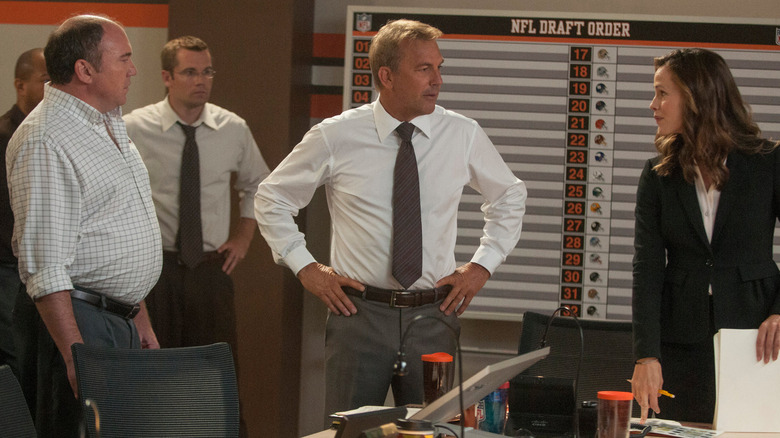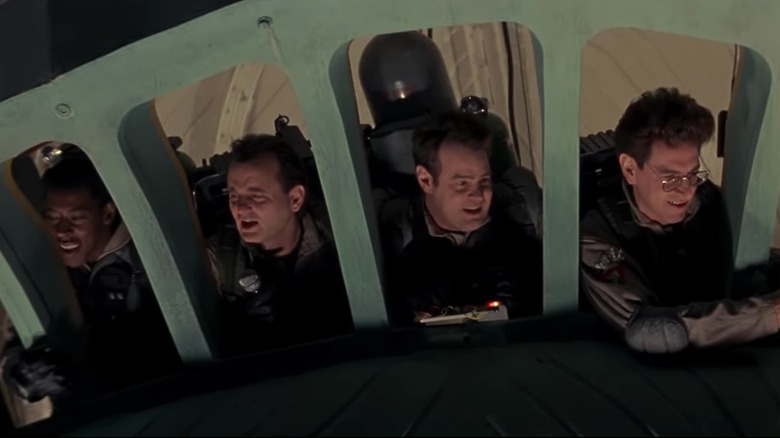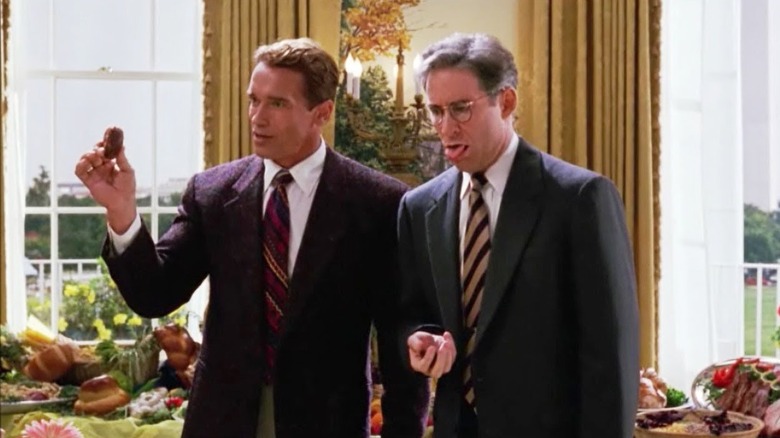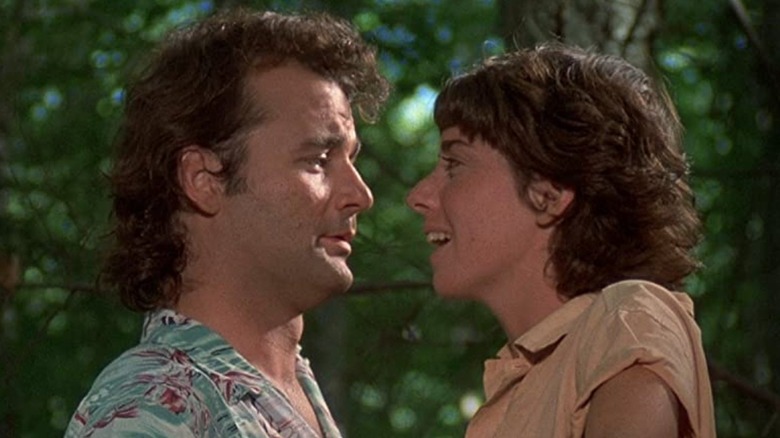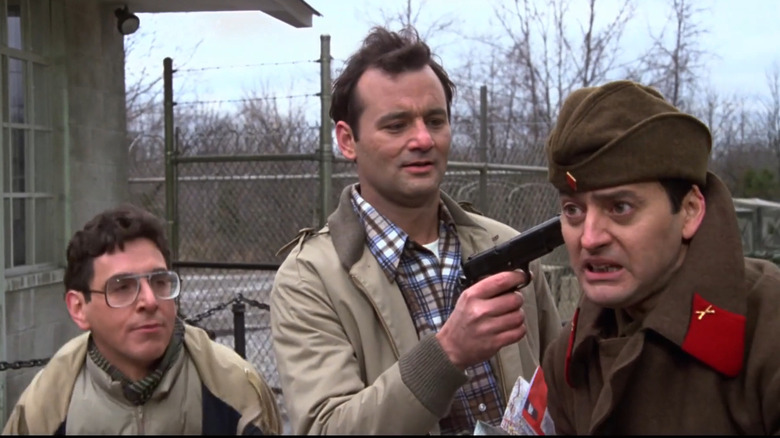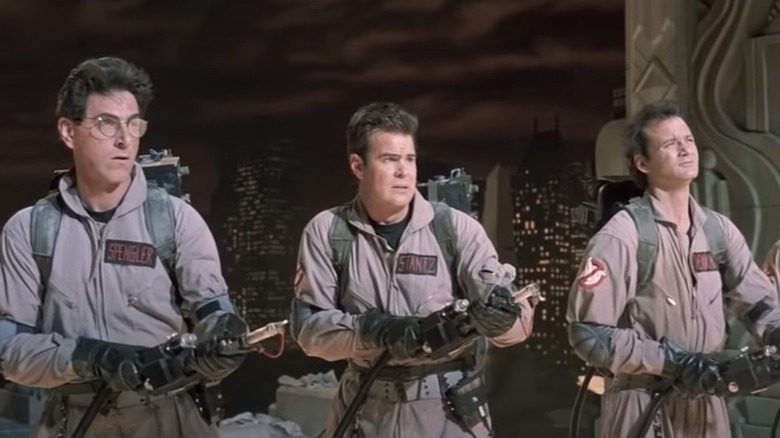Every Ivan Reitman-Directed Movie Ranked Worst To Best
In acting school, my clown professor made us do an exercise in which we laughed and cried in equal measure. It began with laughter. The students' laughs would build and build and then the professor would snap their fingers. On a dime, the laughs became tears. This exercise worked every time. The professor's point was clear: There is barely a line between comedy and tragedy.
This idea applies to Shakespeare's plays. It applies to the films of Billy Wilder and Judd Apatow, even to many "Key & Peele" sketches. It doesn't apply at all to Ivan Reitman. In the late Canadian filmmaker's work, tragedy rarely enters the picture. It's not that Reitman's films don't have stakes. The best and worst of the director's work, from "Ghostbusters" to "Father's Day" to his award-winning grind-house horror film starring Eugene Levy, are built from an often undeniable optimism. Consequently, they give you characters to believe in. Sometimes these characters reshape the government ("Dave"). Sometimes they draft a football player to save their city, no matter what it takes to do so ("Draft Day"). Sometimes they're just ready to believe you ("Ghostbusters"). They all keep the void at bay with remarkable tenacity. It's easy to call Reitman's movies breezy. It's more accurate to call them bravely unsinkable. There's never been a director quite like him.
Here is every Ivan Reitman-directed film, ranked from worst to best.
16. Father's Day
What went wrong with "Father's Day?"
It's a genuine question. On paper, the team of Robin Williams, Billy Crystal, and Ivan Reitman should spark joy. Still, it yielded a movie that earned Reitman his lowest Rotten Tomatoes score ever as a director and finds Crystal and Williams doing some of their most mundane work ever. Failure is inevitable. Failure on the level of "Father's Day" is borderline extraordinary.
To cut the film some slack while chastizing it, "Father's Day" is based on pretty lousy source material. The movie was inspired by 1983's "Les Compères," a Gérard Depardieu movie that was promptly panned upon release. Remaking a mediocre work is a noble aim, sure, but what's wild is how little "Father's Day" either deviates from the original's muddy plot or works to tighten up its shambling humor. Instead, the movie is closer to Gus Van Sant's shot for shot remake of "Psycho" without the morbid curiosity factor.
This is Reitman's most skippable movie by a mile and one that's as confusing as it is sadly boring.
15. My Super Ex-Girlfriend
In the twilight of his career, Ivan Reitman worked behind the eight ball or ahead of the curve. Neither proved ideal. With "Draft Day," Reitman both responded to and anticipated a shift in sports media coverage by dramatizing the heady rush of the offseason. "Evolution," by contrast, feels dated from the jump. The film has too many shades of Reitman's earlier work and "Men In Black" to register as idiosyncratic.
This brings us to Reitman's next-to-last feature, "My Super Ex-Girlfriend," a film that's inexplicably both dated and forward-thinking. And to be clear, the oddness of its timing is its most interesting element. It pains me to say there's little to recommend about "My Super Ex-Girlfriend." It's not a particularly funny movie. It's not a particularly strong romantic comedy. Most damningly, it turns its primary super-heroine into a titanically strong embodiment of "hell hath no fury like a woman scorned" cliches.
There's a version of "My Super Ex-Girlfriend" which does right by its female characters and offers a compelling riff on the superhero genre that is now an inextricable element of pop culture. This wasn't it. Despite game turns from Uma Thurman, Luke Wilson, and Anna Faris, "My Super Ex-Girlfriend" fails to be a solid effort, send up the films that preceded it, or lay new ground for the ones that would follow.
14. Six Days, Seven Nights
If I told you there was a movie that features Indiana Jones going HAM on pirates from the director of "Ghostbusters," wouldn't you want to see it?
This is the catch-22 of "Six Days, Seven Nights." On paper, it's a barn burner. A New York-based fashion editor named Robin (Anne Heche) and her boyfriend (David Schwimmer doing Ross things) take a week-long vacation to Makatea. They meet a grizzled pilot named Quinn (Harrison Ford) and his (much) younger girlfriend (Jacqueline Obradors). Angela and Quinn get thrust together when Angela needs to take an impromptu work trip to Tahiti. Their plane crashes. Star-crossed, romantic-action-comedy mayhem ensues.
Except it doesn't. Instead, "Six Days, Seven Nights" is a charismatic slog. Though Ford and Heche are appealing in their roles, their on-screen chemistry isn't. Ford is at his best when his costar steers the pair's journey (think Leia and Marion Ravenswood). Heche is routinely left to flail by Michael Browning's script, which is less interested in character than chaos. As with those previously mentioned pirates, the chaos is barely earned. That means that Reitman isn't able to stage his usual comedic magic. While the movie has some nice moments (an early sequence in which Ford gets drunk subverts the usual beats of getting sloshed and offers Ford at his finest), it's never so good as its pitch.
13. Cannibal Girls
"Cannibal Girls" is an Ivan Reitman outlier in every sense.
Let's begin with geography: Reitman's first feature is set in Canada and leans into its setting. It stars the country's future comedy legends Eugene Levy and Andrea Martin, both of whom would star in "SCTV" years later. It's set in a small Canadian town and features improvised Canadian folk music. For a filmmaker who made iconic films about the U.S. military, New York City, and the most American of professional sports, "Cannibal Girls" is an outlier.
"Cannibal Girls" is genuinely gruesome. A voiceover at the beginning of the film and a gimmick throughout warning you as much ("In order not to offend or horrify those in the audience of a squeamish or prudish disposition, the sound of a bell in the theatre will warn you when to close your eyes or turn away..."), but warnings only go so far. The gore in "Cannibal Girls" is both schlocky and searing, often bordering on incomprehensible. For a director who made easily digestible comedies, many of which were family-friendly, "Cannibal Girls" is an outlier.
Is it good? Not exactly. Does it have lots to recommend? As a curiosity piece, absolutely. Levy and Martin won acting awards for their performances at the Sitges Film Festival, and their combined full-body commitment is a minor B-movie miracle. The film is grainy yet shot with care. It doesn't have hope, but it has spunk.
That makes it the ultimate Reitman outlier.
12. Evolution
For the first two-thirds of "Evolution," it's a spiritual successor to "Ghostbusters."
To be clear, it's not as good as Ivan Reitman's stone-cold classic. Few films are. What "Evolution" re-captures is "Ghostbusters" gorgeous dichotomy between genre-film stakes and lo-fi, ensemble comedy. Even better, every member of said ensemble approaches comedy differently. David Duchovny, like Bill Murray, brings a knowing, droll approach to the material. Sean William Scott and Orlando Jones offer their spins on cinematic clowning. And Julianne Moore, blissfully, gets to be Sigourney Weaver by way of Harold Ramis. Reitman makes each performance feel like pieces of a puzzle. It was one of his most endearing strengths.
If "Evolution" didn't have to end, it might be more enjoyable. Sadly, it does, and its third act is a mess of tired cliches and incoherent plotting. For a while, it's worth the time and echoes of better movies past. Then it evolves into something worth skipping.
11. No Strings Attached
"No Strings Attached" belongs to a rare and strange class of movies that I dub "the pairs partner." Hollywood has a history of releasing films that seem like they were developed in tandem or, at worst, are duplicates of each other. Think "Armageddon" and "Deep Impact," both released in 1998. Ditto "Capote" and "Infamous," which dropped within 12 months of each other. In the case of the Ivan Reitman-directed "No Strings Attached" and Justin Timberlake vehicle "Friends With Benefits," the films might as well be clones. Both share the same basic plot structure (two friends begin sleeping with one another after making a pact to keep things strictly physical). They even made the same amount of money at the box office. Their posters are in the same color scheme and feature flirty staring. It's honestly uncanny.
The other similarities are more and less interesting: Will Gluck, who directed "Friends With Benefits," is something of an Ivan Reitman successor. Like Reitman, Gluck specializes in comedies with dialogue that has a specific crackle that subsequently fuels his film's cinematic ambitions. Yet, neither Gluck nor Reitman could make their projects tick. "No Strings Attached," in particular, is little more than a great, vulnerable, and R-rated turn from Natalie Portman. The actress won the Oscar for "Black Swan" a few weeks after, and the fact that her victory is more memorable than the entirety of "No Strings Attached" speaks to its low ranking on this list. Its place in "pairs partner" film history is secured, but that's about it.
10. Junior
Ivan Reitman let himself relax after a win. This is hardly unique. The filmography of the Coen Brothers, by and large, is an alternating series of masterpieces and more relaxed pictures (which are occasionally also masterpieces). What's unique to Reitman is just how charmingly loose his victory laps are. The most famous of these is "Ghostbusters II," which we'll discuss a little bit later on. The less remembered of these is "Junior," a movie so strange and of its time, it's hardly remembered or remembered as a victory lap.
Was "Junior" a follow-up to "Twins?" For my money, the answer is yes. No, you wouldn't describe Reitman's 1994 film, which finds Arnold Schwarzenegger playing a scientist who becomes the world's first pregnant man and Danny DeVito as the colleague who cares for him, as an actual "Twins" sequel. It is a spiritual one instead. Both films rely on the odd but palpable chemistry between Schwarzenegger and DeVito. Both films use science to justify the existence of unlikely and misfit familial bonds. And even if "Junior" can't reignite the spark that made "Twins" feel revelatory, it adds the incredible Emma Thompson and Pamela Reed to the fold.
9. Legal Eagles
"Legal Eagles" is a failure of excess and ambition. It attempts, against all common sense, to merge a legal thriller with a fizzy 1940s comedy — but also a courtroom drama and Robert Redford tap dancing. There is so much stuff in Reitman's "Ghostbusters" follow-up. There's so much plot. There are so many decisions. If the trifecta of "Meatballs," "Stripes," and "Ghostbusters" was Reitman's rise to glory, "Legal Eagles" was him flying Icarus-like straight towards the sun. It's hard to call it objectively good.
Then again, there are so many great things in "Legal Eagles," such as the previously mentioned Robert Redford tap dancing and doing slapstick and a sequence in which Darryl Hannah talks about watching a woman burned alive in her car before actually blowing up and then revealing "blown up Darryl Hannah" was a mannequin. Against all odds, Debra Winger gives a tremendous performance that's constructed from rusted, spare part cliches. "Legal Eagles" is a film made by a director riding the high of making it and falling back to Earth still grinning. It's one heck of a ride.
8. Kindergarten Cop
For adults born between 1978 and 1985, Arnold Schwarzenegger feels like a magic trick. The former governor of California seemed like an illusion in childhood and still does now. After all, it's hard to believe one man could be Mr. Oylympia, the Terminator, and the Republican leader of a notoriously Democratic state. Schwarzenegger is all those things and more. He's also the Kindergarten Cop.
In many ways, Schwarzenegger was an ideal fit for Reitman's tone and aesthetic. He makes the ridiculous feel grounded just by existing. At the beginning of his career, Schwarzenegger seemed genuinely thrilled to be in movies — his every appearance carried the glow of someone basking in and grateful for stardom. That echoes the sincere nature of Reitman's best work, and the two of them in tandem allow "Kindergarten Cop" to soar even before we meet an ensemble of incredibly funny children in spot-on set pieces.
The plot of "Kindergarten Cop" is head-spinning at best and has inspired even less sensical copycat efforts: John Kimble (Schwarzenegger) must pose as a kindergarten teacher to catch an evil drug kingpin (Richard Tyson) and his accomplice mother (Carrol Baker). Don't think too hard about it. Enjoy the vibes, the mania, and the heart instead. They're magical.
Schwarzenegger and Reitman were replaced by Dolph Lundgren and "Jarhead 2" director Don Michael Paul for "Kindergarten Cop 2," which proves how easily one could miss the point of their influence entirely.
7. Twins
The most exciting part of "The Lost City" trailer isn't Daniel Radcliffe acting nebbish or the reveal of a perfectly coiffed Brad Pitt. It was two mid-clip title cards. One reads "Bullock," and the other reads "Tatum." Their mission statement was clear: Establish Aaron and Adam Nee's film as an old-school, movie star romp. "The Lost City" features actors so universally beloved that their forenames aren't worth mentioning. Any number of '80s and '90s movie posters reinforced this marketing concept. "Demolition Man" did it. "Scent Of A Woman," too. Most notably (for this article), so did Ivan Reitman's "Twins."
Few movie posters have ever sold their film's appeal more concretely than that of "Twins." Schwarzenegger and DeVito, side by side in matching suits, look like the oddest, coolest pairing of all time. In no way does the "Twins" poster hint at a contraband subplot, nor does it say anything about the movie. The point is an unlikely duo of actors directed by the guy who made "Stripes" and "Ghostbusters." Sometimes, that's enough.
In the case of "Twins," it is. The script offers little more than an excuse for Schwarzenegger and DeVito to crackle and pair like comedic, covalent bonds. When they do (like in the infamous "don't mess with my brother" sequence), the results are effortlessly charming and idiosyncratic. They could only come from Schwarzenegger, DeVito, and Reitman. No forenames need to apply.
6. Draft Day
"Draft Day" is simultaneously one of the best and worst sports movies ever made. If your definition of a "good" sports movie is dependent upon a movie making sense, then "Draft Day" is a trash fire through and through. The trades that Sonny Weaver Jr.(Kevin Costner), the Jaguars, and the Seahawks make in the film's third act are so borderline inexplicable that ESPN and the entire town of Bristol, Connecticut, might spontaneously combust if they occurred in real life.
Sports movies are also, by and large, tributes to sports and their spirit. This, "Draft Day" understands. "Save football in Cleveland" isn't just Weaver Jr.'s modus operandi throughout Reitman's film, it's code for "save Cleveland's soul." "Draft Day" understands that professional sports shape the economics of a city and heal its heart faster than actual government policies. Whatever you make of that reality, there's no denying that "Draft Day" treats its proverbial event with that level of gravitas. The script is unquestionably zippy. Every performer brings their A-game (and it's an eclectic bunch, from Frank Langella to Griffin Newman to real-life running back Arian Foster). Then there's Ivan Reitman, who sees fit to add in-camera tricks and fluid movements which echo the hyper-stylization of sports broadcast.
It all adds up to a picture that, like the right draft pick, just works. It's a great sports movie.
5. Ghostbusters II
"Ghostbusters II" will forever be Ivan Reitman's red-headed stepchild. It exists to be a cinematic impossible ask — namely the follow up to the most improbable (and, at the time, financially successful) comedy of all time. There are so many ways "Ghostbusters II" is wildly successful. It has a compelling and frightening bad guy. It unleashes the full comic force of vintage Peter McNicol for 100-plus minutes. Most importantly, it finds Reitman flexing fun cinematic muscles. The courtroom and sewer ooze sequences are as gleefully intense as anything from the creative team's first indelible effort, and it should be discussed as such.
What holds "Ghostbusters II" back? Some of its best elements, honestly. The climatic "Higher and Higher" set piece is alternatingly wonderful and cloying. The latter of which "Ghostbusters" never was. But that's just it — "Ghostbusters II" wants to be cloying and show a maudlin, quirky version of the Big Apple. "Ghostbusters II" is closer to "Pizza Rat" and the Naked Cowboy than it is 1980s New York. For all its innovation and grit, New York is as goofy a city as has ever existed. It birthed Coney Island and gave Andrew Lloyd Webber a near-permanent stage to play on. Even if giving in to that impulse makes "Ghostbusters II" a lesser effort than its predecessor, it's still an essential New York movie — even if some New Yorkers might be ashamed to admit it.
4. Dave
Of all this year's entertainment news, good, bad, and in between, the development that's brought me the most joy is Martin Scorsese's Film Foundation launching a virtual screening room for restored films. It's no secret that the slow death of physical media means movies are getting lost. (Literally. The Film Foundation explains as much.) While this screening room won't necessarily yield new cinephiles, it's a place to keep great art alive.
I mention all of this because there's a world in which Ivan Reitman's "Dave" becomes one of these lost movies. A former basic cable standard, it doesn't have flashy set-pieces. While it's filled with unimpeachable movie stars (Kevin Kline and Sigourney Weaver, chief among them), those stars don't carry water with younger generations. Unquestionably, "Dave" is one of Reitman's tightest comedies. It is a film that asks for empathy in vitriolic political discourse, and it's a low-key ingenious work of satire. The White House's chief of staff (Frank Langella, rarely better) employs a small town business owner named Dave Kovic (Kevin Kline) to serve as the president's (also Kline) body double. When the president suffers a stroke, Dave steps into the role de jour. There are so many ways this premise could have been disastrous. Instead, it's quietly optimistic about the possibility that warmth, kindness, and clarity of vision are the actual heart of small-town America. "Dave" shows how politics could be while providing a stark reminder of how they are in our present. It's the sort of film we need more than ever, and one that should never be lost to time.
3. Meatballs
A work of art can be iconic without being flawless. Sometimes being iconic is more important. Without iconic works, the pop culture needle doesn't shift. "Parasite" is a great work that's also iconic. Hanson's "Mmmmmbop" is iconic — so are "Lost" and "Black Panther" and "Shoes" by Liam Kyle Sullivan. They are all different kinds of iconic. Some are flawed and some are nearly flawless. The culture is lucky all of them came out.
"Meatballs" is iconic.
It would be impossible for me to defend all of the content in "Meatballs" in 2022, and I wouldn't want or try. What is worth celebrating is how fleetly it establishes Bill Murray as a movie star. Murray and "Meatballs" come to embody and define Gen X's indelible spirit. Rich Cohen wrote about this eloquently for The Hollywood Reporter, but it doesn't take a seasoned journalist to see it. Murray deploys an effortless cool throughout "Meatballs" and projects an energy that is both sorrowful and forever trying to change things despite itself. But it's not just Murray. "Meatballs," in its very marrow, is a deeply personal project. Reitman got old camp friends to write a script about summer camp. He put real campers in the film's mess hall scenes. Whether audiences realize it or not, "Meatballs" is a testament to writing and making what you know without apologizing for it, no matter how rough around the edges it may be. That's Nirvana. That's "Reality Bites."
It's the beginning of Gen X iconography, and for that alone, "Meatballs" is cinema history.
2. Stripes
"Stripes" is when Ivan Reitman levels up. Early Reitman is gleefully sophomoric. "Stripes" is ambitiously sophomoric. "Meatballs," "Cannibal Girls," and "Foxy Lady" are shambling. "Stripes" is shockingly focused. Though its heroes are erstwhile slackers, its set pieces snap with precision. Show anyone the movie's "Razzle Dazzle" sequence, and they'll note Bill Murray's alarming glibness for firearms and the scene's sudden bursts of choreography. Murray's dancing and Reitman's camera work recall vintage Gene Kelly pictures.
"Stripes" is impeccable. "Stripes" is dumb. Reitman gives no quarter between these polarities. The film's balance of shaggy laughs and coordinated action has been replicated by more action comedies than even the Letterbox'd faithful can count. Reitman refined it in his classic "Ghostbusters" in much the same way that "Stripes" was a refinement of "Meatballs." "Stripes" undoubtedly paved the way for "Midnight Run" and the early works of David Gordon Green. However, in "Stripes," the subtext of these movies is text. Comedy is an act of precision that rails against militarized precision. It offers the release of love, not war. Thanks to its setting and constant flow of one-liners and riotous sight gags, "Stripes" is the definitive antiauthoritarian comedy film. Boom-shaka-lacka-lacka.
1. Ghostbusters
There is no world in which "Ghostbusters" should work.
As noted video essayist and coconut enthusiast Patrick (H) Willems noted in an excellent video, "Ghostbusters" isn't about anything. The primary characters don't really change. There is zero thematic purpose. Its antiauthoritarian aims are less pointed than those of "Stripes," and it's technically one of Reitman's most scattershot pictures. Even the willingly all over the place "Draft Day" is more structured than the director's 1984 classic. This isn't a criticism. This is an appraisal of what makes "Ghostbusters" miraculous.
To risk angering both sides of an often toxic discourse, the reason 2016's "Ghostbusters: Answer the Call" and 2021's "Ghostbusters: Afterlife" can't touch the original is because it's impossible to capture its lightning in a bottle again. It's resistant to stone-faced mythologizing. "Ghostbusters" is great because it's the purest strain of confection ever filmed. It is sugar as a five-star meal. It is soundly and furiously funny, signifying nothing and becoming everything. Even if it were Ivan Reitman's only movie, it would forever keep him a part of the comedic cinema conversation.
It's the crown jewel in a stellar and crowd-pleasing filmography.
